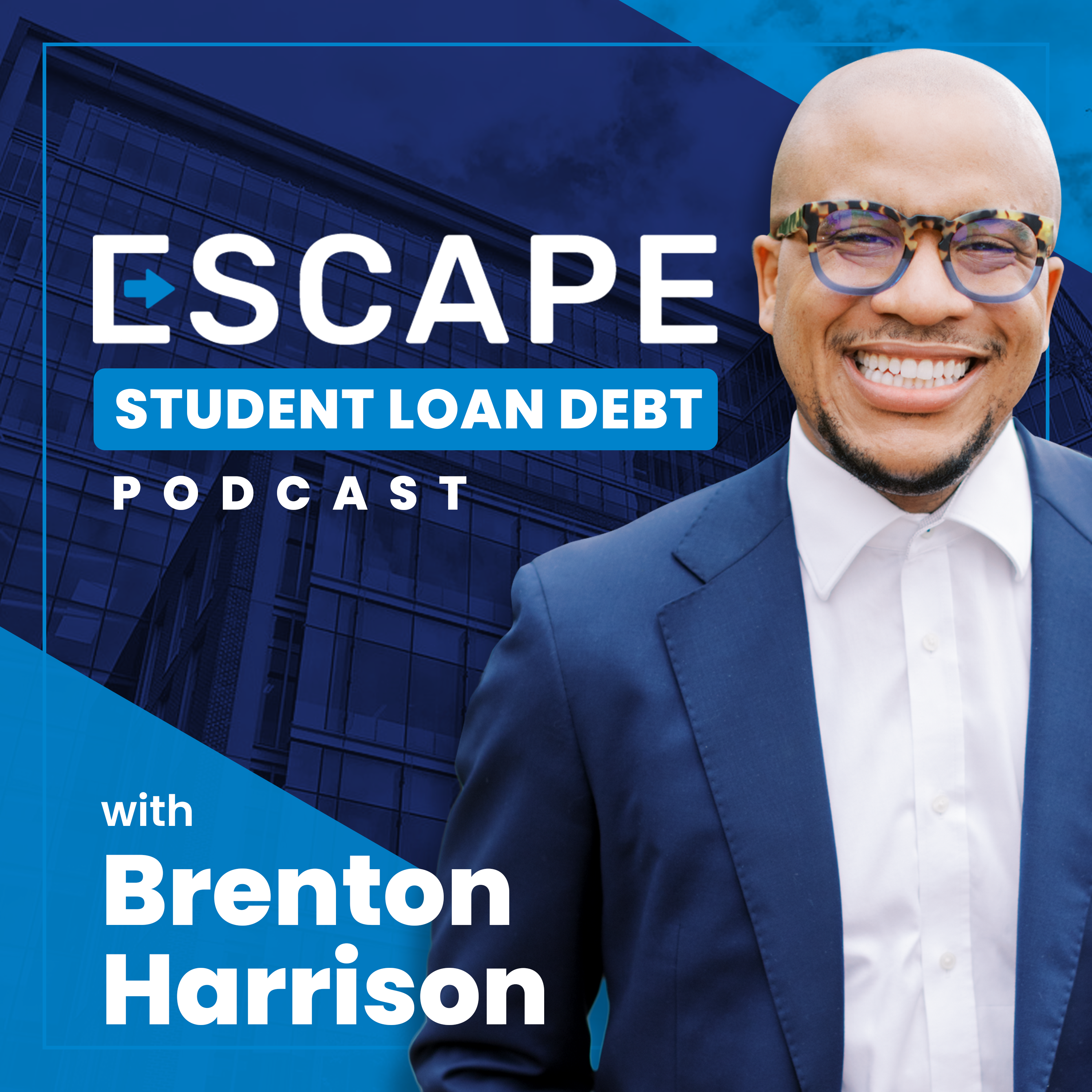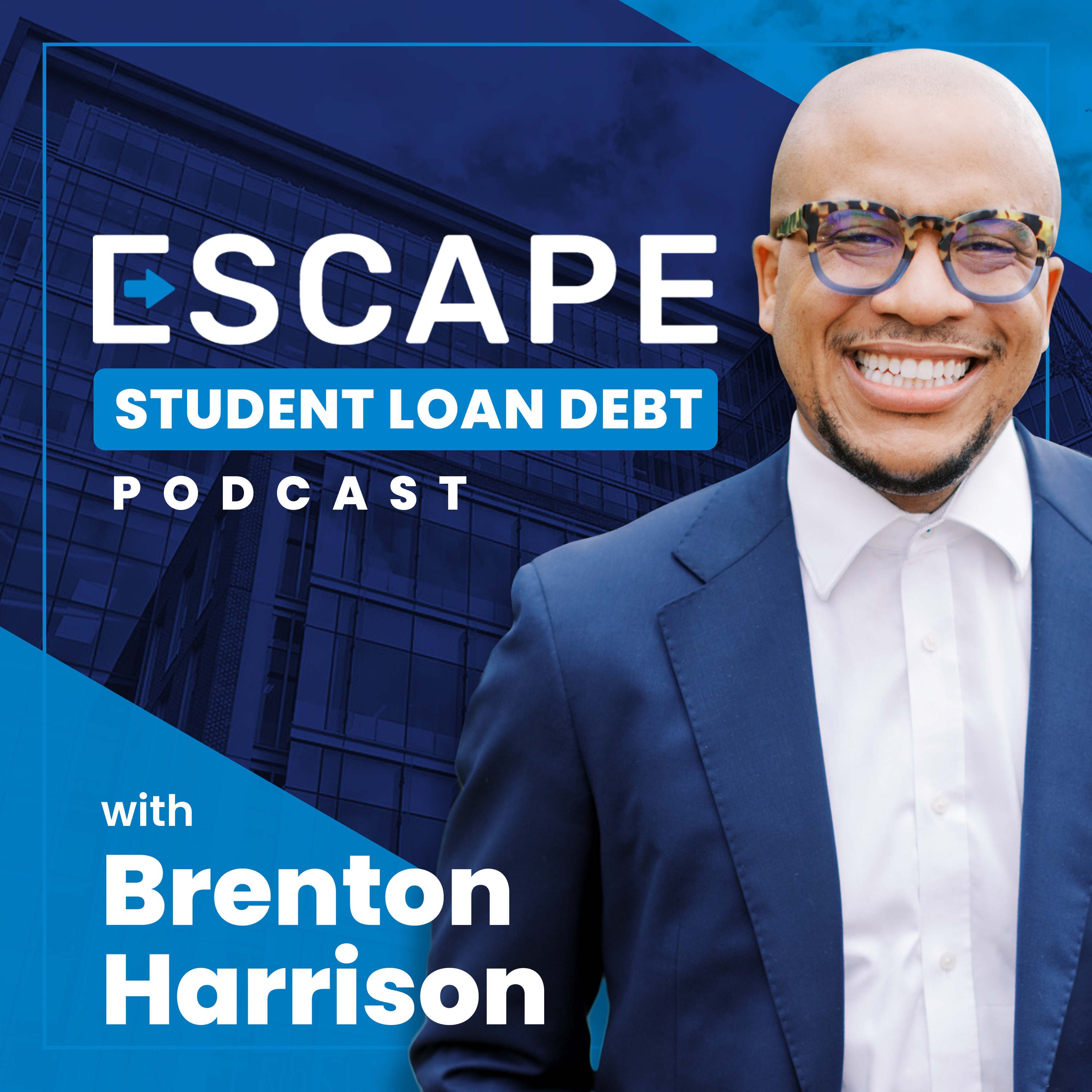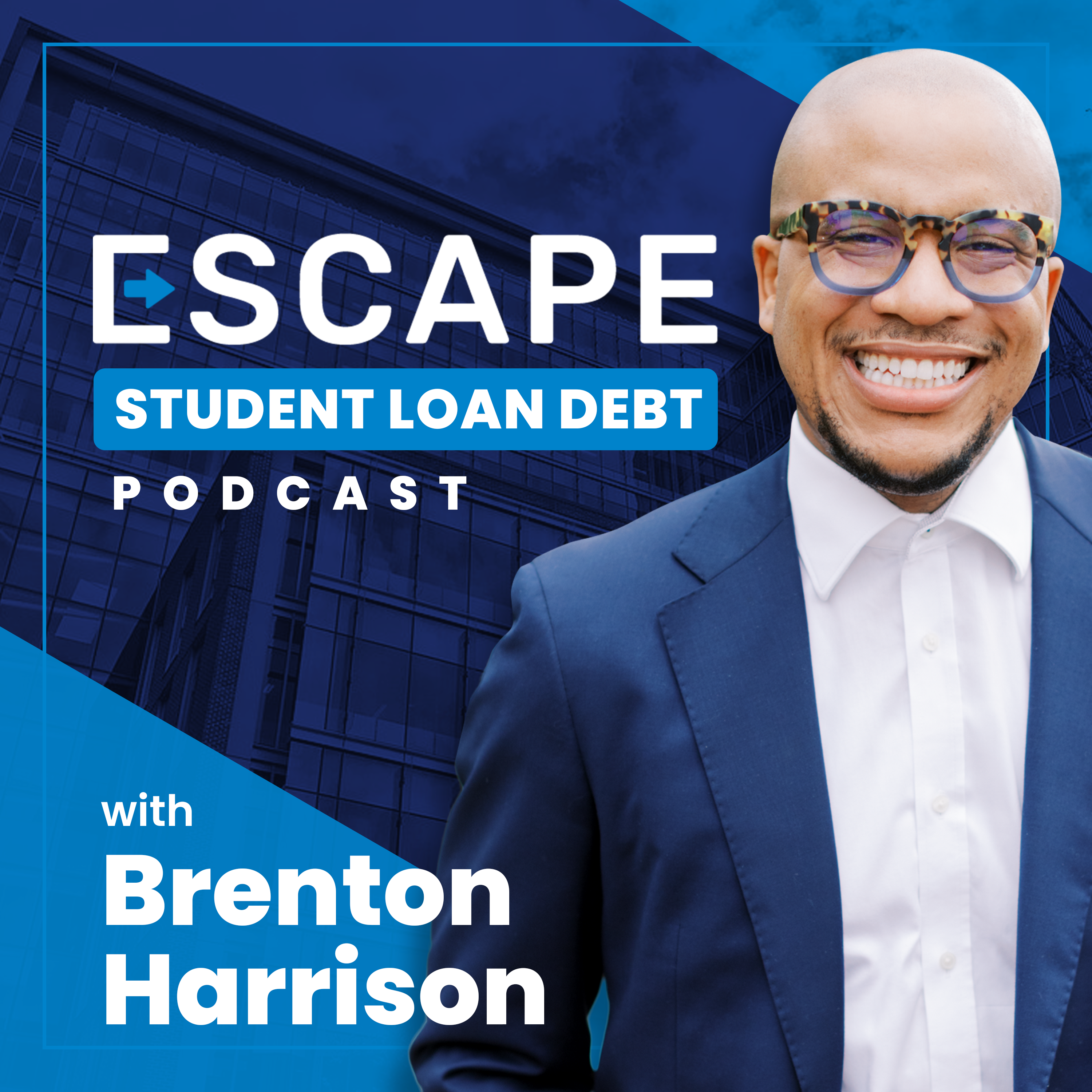Episode Transcript
Brenton: [00:00:00] Private student Loan rates don't offer anywhere near the flexibility of what you find with federal student loans. So it begs the question, why would you refinance your loans in the first place? Well, in this episode, we give you your answer. Let's get started.
Brenton: Hello, my name is Brenton Harrison of Escape Student. Loan Debt, and your host. For the Escape Student Loan Debt podcast. In our most recent episode, we talked about some of the differences and the pros and cons when comparing federal student loans to private student loans. And in that episode I shared that you lose a lot of the flexibility and allowances that come with having federal student Debt when you refinance with a private lender.
So if you're listening to that episode, you're probably wondering like, why would someone do that in the first place? What is the benefit of refinancing?
Well, I would say for the typical person who listens to this podcast, there's not much of a [00:01:00] benefit because you likely have a tremendous amount of student loans. People who owe at least six figures in student loans or who owe at least a hundred percent of what their annual income is in student Loan Debt.
And that a hundred percent of annual income is a kind of line in the sand that I've used many times in the past to kind of give you an idea of when you should or should not be looking into refinancing with a private lender.
The reason being is that when you calculate what your payment would be under programs like the Income Driven Repayment plans, your payment each month reduces your Debt by so much that you end up paying it off in full before the 20 or 25 years comes to fruition that it takes before any remaining balances are forgiven.
Now that can be a little different if you're working in public service and you're pursuing things like public service Loan forgiveness.
But my kinda line in the sand is if you owe less than a hundred percent of your pay each year in student loans, you might need to at least consider refinancing with a private lender.
If you owe [00:02:00] more than that, it's not like there's never a scenario where it would benefit you to refinance, but it is a higher likelihood that it benefits you more to pursue forgiveness under Income Driven Repayment plans.
But in this episode, we're gonna dig a little deeper into the people who should consider refinancing and what that process would look like if they choose to do so. So why would you refinance in the first place? There are really two reasons that you would do it, and those reasons are connected. The first reason is what I just discussed.
You are on track to pay off your student loans in full before they are forgiven. You Earn too much under the Income Driven Repayment plans for it to benefit you to use them and instead you might be attracted to something like a standard plan because you know that you're gonna pay off that student Loan in full.
So that's reason number one. Reason number two, and it's a connected reason, is when you look at the interest rate on that federal student Loan, it is higher than what you would find in the private marketplace. There [00:03:00] is no reason to refinance a federal student Loan if the interest rates that you see in the private sector are higher than your federal Debt.
And this is not a one-time thing. When you look at these interest rates, both for your federal Debt and for your private Debt, that can change frequently.
Now federal Debt changes less frequently Each year. Congress sets the rates for federal student Loan Debt, and they base it off of the 10 year treasury yield and a margin for that student Debt. That's more than we need to get into in this episode, but if you're following along with us on screen on our YouTube channel, you can see that the current interest rate for direct subsidized and unsubsidized loans is 4.99% for undergraduate students. If you are a graduate student and have a direct unsubsidized Loan, the current rate is 6.54%.
And if you're a parent or a graduate or professional student and you're getting a direct plus Loan, the current rate for that student Loan is 7.54%. So with this federal Debt, the rates work a little differently. It's not based off of your credit or anything like your [00:04:00] co-signer, as we discussed with private student loans.
It's based off of what Congress decided it will be for the upcoming year, and they set those rates each spring. So let's say that you have a parent plus Loan or a direct unsubsidized Loan that's at 6.54 or 7.54%, and you have looked at what your income is. And what your payments will be on these student loans to know that you're on track to pay it off in full within 15 or 17 or 18 years.
If you could find an interest rate in the private sector for significantly lower than these amounts, it could benefit you to refinance them. And even an interest rate difference of half a percent can make a tremendous difference over the course of 10 or 15 or 20 years.
As a matter of fact, if you're following along with us on screen again, I did a simulation and I assume that we had two student borrowers.
One of them owes a hundred thousand dollars at 6.67%, and the other owes a hundred thousand dollars that they're repaying at 5%, and we're going to assume that each are [00:05:00] paying these debts off over 20 years. If you look at the person who owes a hundred thousand dollars at. 6.67%. Their monthly payment would be $756.
That would pay off their a hundred thousand dollars in full over 20 years. But in addition to that principle, they would pay $81,000 in interest, so their total payments would be about $181,000 on an original a hundred thousand dollars Debt. Conversely, if you look at the person who owes a hundred thousand dollars at 5% interest, their monthly payment is basically a hundred dollars a month lower.
It's $660 as compared to $756. It's still 20 years that they're using to repay it, but instead of paying $81,000 in interest, they pay a little over $58,000. So in total, they pay $158,000 as compared to $181,000. Even though they're paying it off in the same period of time for almost a hundred dollars a month less, that is the power of a [00:06:00] percent and a half difference.
But I would say that line in the sand for federal to private needs to be at least a percent before I would take action on pulling the trigger.
Now once you've refinanced with a private lender, you might be tempted to think you can only do it once. So if interest rates go even lower a few years later or a year later, you think you've missed your opportunity.
That is not the case. Private student loans are very different when it comes to how you refinance it. We'll talk about a little more after the break, but what I want you to know before the break is you can refinance a private student Loan an endless number of times without adversely impacting the amount you owe on that Debt.
And private student Loan rates can change much more frequently than what you find with federal student Debt. Part of the reason is, as we discussed in the previous episode, instead of basing it off of the 10 year yield, they base it for private loans off of things like for older loans, the L I B O R, the London Interbank offertory rate, or more recently, the secured overnight financing rate. And [00:07:00] the secured overnight financing rate changes literally daily. So you see private student lenders who might change their interest rates on a weekly basis or a monthly basis but when compared to federal student loans, you see a lot more fluctuation in the private space.
So now that you know all this information, who are ideal candidates to refinance with a private lender? Well, in addition to that 100% of your income marker, I would say that people who are most likely to see significant savings in the private space are people who not just owe a smaller amount but also have a strong income and strong credit based off of private student loans. You know that it's your co-signer credit if you need a co-signer, it's your credit. It's the stability of your income. When all those things are working in your favor, you have a better shot than most of looking at private rates for what you would receive and seeing significant gaps between that federal student Loan rate.
But I would go a step further because there are groups of people who, when they look at that percentage of income that they owe in [00:08:00] student Debt, it is not yet to the point where they owe less than a hundred percent of what they Earn, but in the future it will be. So if you keep in mind someone like a PhD who might be like an associate professor now, but is on tenure track.
If you think about a young attorney who may be making a first year associate salary, but in years subsequent, they'll make a significantly higher amount if they stay on that track. You see this most frequently with physicians where you have a physician who might be in training for a residency or a fellowship, and they're in a highly specialized, um, medical subset.
So you might have a dermatologist or a surgeon, and right now when they look at their student loans, maybe they owe 200,000 and they're getting paid 70 or 80, but the time may come when they owe 200,000 and they'll be making 300 or 400,000.
These are the type of people who, even if they don't refinance now, It may be a part of their future to say, once I start making this, especially if I'm in private [00:09:00] practice and not pursuing public service Loan forgiveness, at that point in time I may not be an ideal candidate for Income Driven Repayment.
It may benefit me instead to look into the private marketplace to save some money.
So if you find yourself in this small subset of people after the break will tell you how the refinancing process for private student loans differs greatly from most forms of Debt and how in many cases it can benefit you to looking to refinancing private student Debt as frequently as quarterly.
[00:10:00]
Brenton: To break down the reasons of why it can benefit you to look into refinancing a private student Loan as frequently as quarterly, I first have to explain the process of how you refinance most Debt. So for example, let's take a mortgage.
If you have a mortgage and you're trying to look into refinancing it, one of the first things that you have to do to get some hard and fast interest rates for what you might receive on that refinance Loan is you have to do a hard pull of your credit.
Second issue are the refinancing cost. With most forms of Debt, you don't get to just refinance for free.
Going back to the mortgage process, there are closing [00:11:00] costs. When you have a mortgage, you have to have your home appraised. An appraisal might run you in the range of 500 or $600. When you look at the closing cost for that refinance mortgage, it can typically run you anywhere from 1%. To 3% of the mortgage costs.
So for example, let's say that you have a $300,000 mortgage that you're trying to refinance, and they're charging you 2% in closing costs and $500 as an appraisal fee. That's $6,500 that it costs you just to go through the process of refinancing that Loan. When you combine that with the credit pool, it's not something that you do when it comes to home refinancing for the sake in most cases of saving maybe a quarter of a percent on your mortgage. It needs to be a pretty significant gap.
Now, I've shared that when you're taking a federal Loan and refinancing with a private lender, I would want you to experience at least an interest savings of a percent or so, which is just my personal opinion.
But let's assume that you have a private student Loan already and you're trying to save on [00:12:00] interest rates for an already private Loan. Well, in that case, there doesn't need to be as big of a gap. If you feel like you'd save money by a quarter of a percent difference or a half a percent difference, it can benefit you to refinance with a private lender for these reasons.
The first reason is for most private student lenders, they will give you a strong idea of the interest rate that you will receive without doing a hard pull of your credit at all. As a matter of fact, you can go through the process in two or three minutes with a private student Loan lender, and they will give you an introductory rate all by doing a soft pull of your credit, which does not impact your credit score.
For this reason, whenever someone's considering refinancing with a private student Loan lender, I always tell them to check out at least three or four, because as long as these are soft pulls of your credit, you can get three or four different interest rates and compare and contrast them without having any impact on your score at all.
As a matter of fact, if you're looking on screen, I actually have, uh, a business who specializes not just in student Loan [00:13:00] advice. If you all are looking for additional advice beyond my own, I think they're a great place to look. The business is called Student Loan Planner. They have a lot of great resources.
But another reason I often send people to their site if they're looking into refinancing, is they've negotiated a number of refinancing bonuses and deep discounted rates with private lenders with which they have a relationship. So if you're looking on screen, we're looking at SoFi Splash Financial.
Earnest, Laurel Road, Education Loan Finance, Credible, and you can see kind of a range of those rates. Matter of fact, if you click on SoFi, they tell you that you can check your rates in two minutes, and they state right on the website, there is no impact to your credit score.
So the first thing we talked about credit. The second thing we talked about was the cost of refinancing. Unlike most forms of Debt, the majority of private student Loan lenders do not charge closing costs to refinance private student loans.
That means in our example, if you had a $300,000 private student Loan instead of a $300,000 mortgage, you could [00:14:00] refinance it 10 to 15 times, and every single time that you do it, you're gonna owe the exact same amount on that new Loan that you did on the old Loan.
This is why I tell people to not be afraid of checking to see if there are interest rates available because it doesn't hurt you to at least see what's out there. And as for the frequency with which I tell people to check, I tell people quarterly because if you look at most lenders in terms of how often they adjust their rates, it happens to be quarterly.
So it doesn't have to be something that you do in great detail. But if it were me and I owed a significant amount in private student Debt, if I were up watching a TV show late at night, why not? Check a page like the one that you see in front of you, which we'll put in the show notes and see what you might be eligible for if you decided to refinance that Debt.
So that's a quick breakdown of some of the pros and cons and the processes for why you would refinance a student Loan. In future episodes, which we might take a break or two, uh, and spread it out because there have been some changes that have come to federal, uh, payment [00:15:00] plans.
But in future episodes about private student loans, we'll get into the timing of when you might consider refinancing for those who are potential candidates for it.
And if you like what you're hearing, share it with a friend. If you're not signed up for our email list, sign up for our email list at escapestudentloandebt.Com and I will see you again soon.


